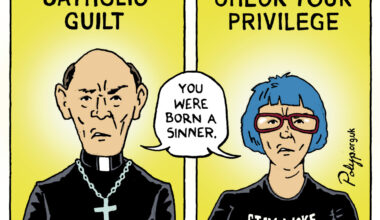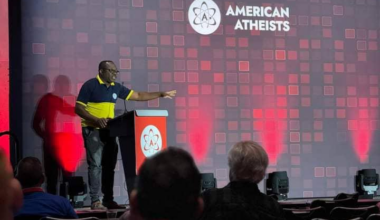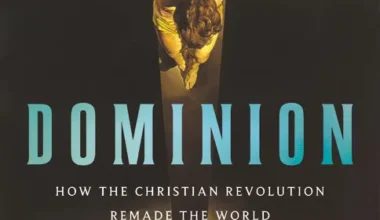This piece is republished with permission from the National Secular Society’s website, where it first appeared on 17 September 2025.
Is Britain on the brink of a spiritual comeback? After decades of emptying pews and rising nonreligiosity, talk of a Christian revival is growing louder. But what’s emerging looks less like a genuine religious awakening and more like Christianity being used as a vehicle for political and cultural agendas.
Take, for example, Tommy Robinson’s recent ‘Unite the Kingdom’ march in London, where Christian nationalism was out in force. Amid the Union Jacks and anti-immigration slogans came men dressed as crusaders, bible verses on banners, crosses held high, and open calls to “reclaim” Britain for Christianity.
Some of the most alarming rhetoric came from Brian Tamaki, leader of New Zealand’s Destiny Church. From the stage, he thundered:
This is a religious war… Islam, Hinduism, Baháʼí, Buddhism – whatever else you’re into – they’re all false. We’ve got to clean our countries up. We’ve got to get everything out that does not know or receive Jesus Christ. Ban. Ban any type of public expression from our Christian nations from other religions. Ban halal. Ban burqas. Ban mosques, temples, shrines — we don’t want those in our countries.
As the crowd cheered, several flags, including one with ‘secular humanism’ written on it, were torn apart on stage. All this at a supposed ‘free speech rally’.
Robinson himself has increasingly invoked faith as a marker of British identity. He has spoken about finding God after attending a weekly bible study with a chaplain during his latest stint in prison. Robinson, real name Stephen Yaxley-Lennon, left prison wearing a rosary and later told podcaster Liam Tuffs:
I’ve gone through the Bible. And as I went through it, I realised everything is from the Bible. Every saying, everything, every part of what our country has been built has come from the Bible… And when did this country start to fall? When did it decay? When it lost its faith and identity.
This is a familiar line that has gained traction among conservatives who claim Britain’s loss of faith lies at the root of national decline. The argument goes that Western liberal democracy is wholly rooted in Christianity, and that unless we “return to God,” our freedoms will inevitably wither. Historian Tom Holland’s bestselling book Dominion is often co-opted to bolster this narrative, held up as proof that modern values are little more than Christianity in disguise. But this romanticised account overlooks the long and often bloody history of Christianity’s resistance to democratic principles. Far from nurturing liberal democracy, the Church spent centuries entrenching hierarchy, suppressing dissent, and opposing individual rights – advances that came about despite religious power, not because of it.
For over a thousand years, Europe was dominated by a Church that defended hierarchy, not liberty. Medieval Christendom wasn’t a cradle of democracy; it was a theocracy that demanded obedience. Kings claimed a “divine right” to rule, while those who challenged religious authority were branded heretics and often killed. Church courts stifled free thought, and church leaders gave their blessing to absolute monarchy. The Inquisition didn’t protect civil liberties; it crushed them.
The roots of modern liberal democracy lie in the Enlightenment, when thinkers began to challenge the authority of both monarchs and priests. John Locke argued that governments need the consent of the governed and that religious authority has no place in law. Voltaire ridiculed clerical power and demanded freedom of conscience. Thomas Paine, a key voice of the American Revolution, fiercely attacked Christianity as a system of tyranny and superstition.
These pioneers weren’t defending Christian tradition; they were breaking its stranglehold on public life. The separation of church and state, embedded in the French and US constitutions, was a conscious rejection of religious rule. It remains one of the strongest checks we have on clerical power, and a prerequisite for any truly democratic society. Yet Britain still clings to an established church, leaving the door ajar for those who would blur the line between faith and state.
In the context of the Christian nationalism that reared its ugly head on London’s streets last weekend, the Bible Society’s talk of a “quiet revival” starts to sound somewhat ominous. Their recent YouGov-backed report claims monthly church attendance in England and Wales is rising significantly, particularly among young people, and especially young men.
It is plausible that there are pockets of renewed religious interest – especially among certain social or ethnic groups – but bold claims of a spiritual resurgence don’t hold up to serious scrutiny. As Professor David Voas of UCL’s Social Research Institute has pointed out, the Bible Society’s figures appear to be the result of flawed survey design, overenthusiastic self-reporting of churchgoing (a well-known phenomenon), or a polling anomaly that overlooks the broader, well-documented trend of religious decline in terms of attendance and belief.
It’s worth noting that churches themselves aren’t reporting anything dramatic happening. Official figures show Anglican attendance still hasn’t returned to pre-pandemic levels.
The Bible Society’s own director of research, when pressed on the BBC’s More or Less, admitted the data had “curiosities” and might be “a bit hot” – though not, apparently, “totally rubbish.” Hardly a ringing endorsement.
But something is going on. While Christian nationalism in the UK and in Europe may not be as pronounced as in the US, American Christian Right funding and influence are starting to infect our politics – and last weekend’s rally is a stark indicator that religion is increasingly being used to recast national identity in religious terms.
It is noteworthy that Parliament’s most vocal advocate for re-Christianising public life, Danny Kruger, has just defected from the Conservatives to Reform UK. Tasked with helping the party “prepare for government”, he is likely to push it towards Christian nationalism – presenting a return to Christian identity as the cure for perceived social fragmentation, lost values, and weakening cohesion.
It may be that Nigel Farage is a more skilled populist than Kruger and recognises that a narrative centred on a religion most Brits are indifferent to is likely to fall on deaf ears – much like Kruger’s recent rallying cry for Christian nationalism in an almost empty House of Commons chamber. Such messaging will limit the party’s appeal and alienate potential supporters. However, any political movement influenced by Kruger is likely to be hostile to secular principles.
This is no time for complacency. British voters should be wary of politicians peddling sectarian agendas under the guise of moral renewal. This path leads not to democratic revival but to theocracy. Using Christianity as a bulwark against Islamic fundamentalism risks replacing one form of religious extremism with another — deepening division rather than defending democracy.
Western liberal democracy wasn’t built on scripture, but on the willingness to break free from it. The claim that only religion can safeguard our freedoms doesn’t just distort history; it threatens democracy by undermining the secular principles that protect everyone’s rights and freedoms equally.
At a time of rising tensions and deepening divides, the rise of anti-secular identity politics is both divisive and dangerous. Secularism does not mean erasing belief – it means ensuring that no belief is privileged above another. In an increasingly polarised world, defending secular, inclusive values is not just important – it is essential to protecting democracy, freedom, and fairness for all.
Related reading
A reading list against the ‘New Theism’ (and an offer to debate), by Daniel James Sharp









Your email address will not be published. Comments are subject to our Community Guidelines. Required fields are marked *
Donate